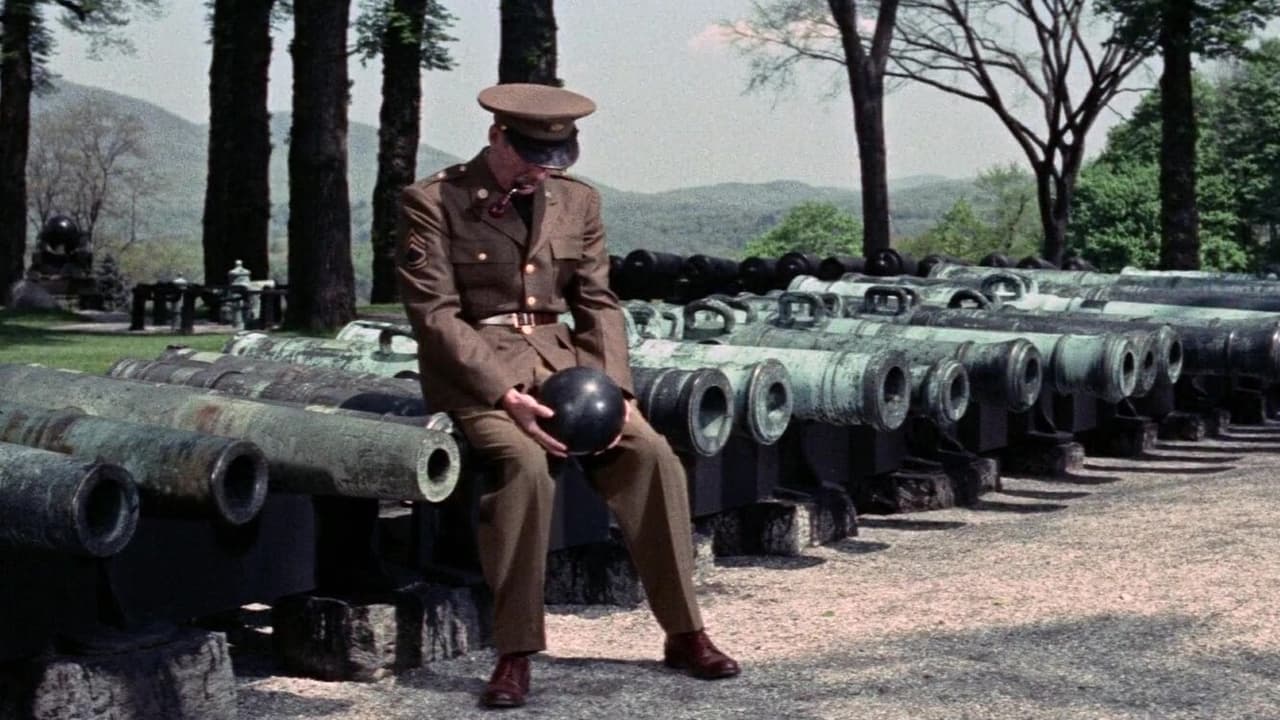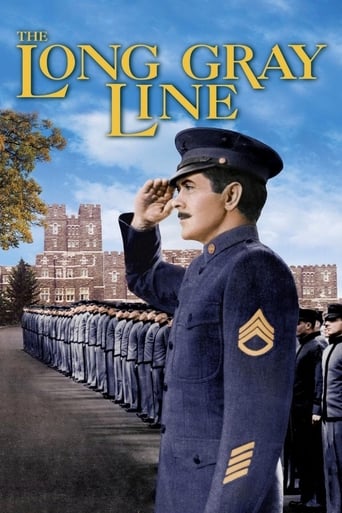



Overrated
Most undeservingly overhyped movie of all time??
It's a movie as timely as it is provocative and amazingly, for much of its running time, it is weirdly funny.
View MoreStrong acting helps the film overcome an uncertain premise and create characters that hold our attention absolutely.
View MoreCopyright 1955 by Columbia Pictures Corp. New York opening at the Capitol: 10 February 1955. U.S. release: 9 February 1955. U.K. release: April 1955. Australian release: 29 September 1955. Sydney opening at the State: 29 September 1955. 12,317 feet. 137 minutes.SYNOPSIS: When the United States Army tries to retire him, Sergeant Marty Maher, athletic trainer at West Point military academy for over 40 years, protests to the President of the United States, whom he had known as a young West Pointer. In doing so, he relates his life history: how he came to West Point as a young Irish immigrant and got a job as a waiter, then took the oath, married Mary O'Donnell, a lively colleen; how, as athletic trainer, he also became friend and adviser to generations of young cadets, including Eisenhower himself, Omar Bradley and James Van Fleet, and others.NOTES: Negative cost: $1.748 million. Initial gross domestic rentals: $5.635 million, making it number 16 at U.S./Canadian ticket windows for the year. Needless to say, the film took nothing like this coin elsewhere, despite the box-office lure of Tyrone Power, Maureen O' Hara and Robert Francis. In Australia, for example, Columbia's receipts did little more than cover the exchange's modest advertising, print and distribution costs.The same procedure was followed by the critics. Whilst American scribes were excessively generous in their praises, overseas reviewers were more guarded, even lukewarm.Last movie appearance of Robert Francis who was killed in an air accident in 1955. After his stunning debut in "The Caine Mutiny" (1954), Francis made "The Bamboo Prison" and "They Rode West", before "The Long Gray Line".Motion picture debut of Betsy Palmer.COMMENT: For those of us with little love for things military in general and xenophobic institutions American in particular, this paean strikes more than a mildly sour note. The fact that it is directed by John Ford only makes our disappointment the more keen. Ford has pulled out all his usual tricks; but the insubstantial and unsympathetic subject matter serves only to starkly reveal the director's various familiar stratagems and sleights of hand for the obvious conjurer's devices they are.However, Ford can be generously lauded for one thing: He consistently uses the CinemaScope camera most effectively. Seemingly endless lines of marching men are paraded right across the screen, whilst set- pieces like the cadets farewell at West Point railway station maximize the impact of crowd scenes. For more human encounters, Ford frames his picture between archways and colonnades to restore the welcome intimacy of the old postage-stamp ratio. I thought Power's performance improved as the picture progressed and that he seemed more convincing in his old-age characterization than in his fresh-from-Ireland youth where his accent and mannerisms struck me as boisterously artificial. Similarly, Maureen O'Hara aged gracefully. From the gauche colleen of her first scenes of kitchen farce to the tired and spent mother of the Academy, Miss O'Hara presents a devoted portrait that backs up the other main players like Donald Crisp (here at his most winning) and Robert Francis. Newcomers Betsy Palmer and William Leslie are also admirably impressive.In addition to these marvelously worthwhile performances, the movie also offers some great production values, including Charles Lawton's superlative photography. Even the many West Point locations are not without interest.Finally, it must be admitted that I did discover three or four genuinely moving moments and at least as many in a lighter vein. But are eight moments enough to sustain involvement in what is basically a jingoistic exercise that tries our patience for 138 minutes?OTHER VIEWS: Typical John Ford production — it even has a reprise, virtually the director's trademark, which I found moving anyway, maybe I'm a pushover for this sort of guff. The John Ford Stock Company is on hand too (Jack Pennick is a recruiting sergeant) and Tyrone Power is in there with an Irish accent that is more than half-way realistic. True, it's an out-and-out sentimental yarn but it's not dwelt on to the point of nauseousness, nor is its boisterous good-humor turned into the incredibly overdone and mindlessly exaggerated slapstick of "Donovan's Reef" or "The Wings of Eagles"... A long running time, but never boring... Robert Francis turns in his usual very capable performance. - JHR writing as George Addison.
View MoreNone of John Ford's films are exactly poorly made, and this one is competent enough as it goes. Basically it's the story of Marty Maher (Tyrone Power), a fresh immigrant off the boat from Ireland who finds a home in America's West Point military academy. Starting off in the kitchens and working his way up to an instructor in football and swimming, Maher finds love with a saucy Irish woman (Maureen O'Hara) and finds himself continuously renewing his enlistment although often against his better judgment. He sees some of the boys he trained go off to die in the war and he has to deal with the emotions of those consequences as well as his duty to the academy. When a favorite student dies in WWI (William Leslie), Maher and his barren wife take in his wife (Betsy Palmer) and help raise his son (Robert Francis).Power's performance is excellent and he manages to carry the film. The process of his aging through the film is admirably handled. But I found the film in general to be somewhat corny and heavy-handed. The message of the film seems to be to reinforce a certain brand of military patriotism that I personally find distasteful. That's not to say that the film is a bad film, but it is what it is. It's very much concerned with propagating the idea of "noble sacrifice", and Power's character barely questions the wisdom of training these young men just to send them off to die. It's as if he brings up the idea that it might not be worth it, just so that Ford and his writers can put that idea to rest as soundly as they can.I like the film for its depiction of the main character as a humble man who often lashes out at others in anger but learns to temper his passions with growing wisdom. But I just can't get into the film -- let's just say that if you're not a huge fan of Irish jigs and military marching bands (or the combination of the two), then you will get just as sick of this movie by the end as I did. There's practically no subtext to the film that I can detect, and in the final analysis it's no more subtle than Ford's wartime pro-Army films. I can't make myself feel happy that the son is going to go off to war and risk death just like his father did, or that there's this great honor and nobility in it all. I won't cheer with Power's character as he rudely dismisses the idea of West Point modernizing its approach to military training. The whole film is basically telling us to resist change and to cherish tradition, and that's an aspect of Ford's personality that I just don't appreciate. But I do appreciate the amount of skill and care that went into Power's performance in particular.
View MoreIn 1955 "Marty" won the Academy Award for Best Picture. Other nominees listed were 1}"Love Is A Many Slendored Thing", 2} "Mister Roberts", 3} "Picnic" and 4} "The Rose Tattoo". I could never understand how this truly great John Ford Classic failed to be nominated for the Academy Award for Best Picture that year. In my opinion, it was a much more deserving candidate than the other films mentioned. Ford's classic is the true story of Marty Maher (Tyrone Power), an undisciplined lad who becomes the assistant to the "Master of the Sword"/Atheletic Director, played by Ward Bond. Young Maher's experiences a character change after meeting Mary O'Donnell (Maureen O'Hara) as he begins to embrace the creed of Westpoint...Duty...Honor...Country. This touching story based on Marty Maher's autobiography "Bringing Up The Brass" provides a heart warming nostalgic rendition of a man who helped trained generals as well as a president through the passage of time. To my way of thinking, this film is somewhat of a cinematic bridge between films like "Goodbye Mr. Chips" and "The Quiet Man". The touching tribute to Marty Maher at the conclusion of the film as he is honored by the ghosts of his beloved past brought tears of joy to my eyes. I recommend this film to everyone who has an interest in what life at Westpoint might be like or to anyone who likes a great movie!
View MoreThis is a very underrated movie from John Ford and a lot of Ford fans don't think much of it. It's not considered one of his best movies and this came out the same year as Mister Roberts. The movie starts out with Tyrone Power coming to America from Ireland and winds up washing dishes at West Point. Power hates washing dishes at gets a better job at West Point as an assistant to Ward Bond, who is head of the athletic department. The movie starts in the year 1911 and has a brief overview of his life at West Point until the 1950's. Power winds up getting married to Maureen O'Hara, who is a maid to Bond, and Power wants to go back to Ireland because of his family. It's a great movie and doesn't even seem that long at over two hours long.
View More